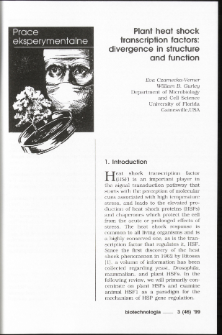- Search in all Repository
- Literature and maps
- Archeology
- Mills database
- Natural sciences
Advanced search
Advanced search
Advanced search
Advanced search
Advanced search

Object
Title: Plant heat shock transcription factors: divergence in structure and function
Subtitle:
Plant heat shock transcription factors: divergence in structure and function
Publisher:
Committee on Biotechnology PAS ; Institute of Bioorganic Chemistry PAS
Abstract:
A multitude of heat shock transcription factors (HSFs) have been isolated and characterizedfrom various plant species (17-23). Based on a phylogeny analysis of the DNA binding domainsand organization of oligomerization domains, they have been assigned to class A and B of theplant HSF family (20,24 and this paper). None of the tested soybean or Arahidopsis HSF classB members were able to function as transcriptional activators and are, therefore, considered tobe inert (26,59). Conversely, class A HSFs from tomato and Arabidopsis displayed an intrinsiciranscriptional activation potential (26,50). There seems to be variation among plant class AHSFs regarding their transcriptional activation functions: some play a key role in activation ofthe heat shock response, while others act in an auxiliary capacity as HSF activity boosters (54).In contrast, the class B inert HSFs are able to trons-attenuate the transcriptional activity ofactivator HSFs (26). We postulated that heat shock regulation in plants may differ from metazoans by partitioning negative and positive functional domains onto separate HSF proteins (59).In plants two classes of HSFs exist: class A members which function as activators of HSP geneexpression, and a novel class B (inert HSFs) which is largely specialized for repression, orattenuation, of the heat shock response.
Relation:
Biotechnologia, vol.46, 3 (1999)-.
Volume:
Issue:
Start page:
End page:
Detailed Resource Type:
Format:
Resource Identifier:
0860-7796 ; oai:rcin.org.pl:142629 ; IChB B-42
Source:
Library of Institute of Bioorganic Chemistry PAS
Language:
Language of abstract:
Temporal coverage:
Rights:
Creative Commons Attribution BY-SA 4.0 license
Terms of use:
Digitizing institution:
Institute of Bioorganic Chemistry of the Polish Academy of Science
Original in:
Institute of Bioorganic Chemistry of the Polish Academy of Science
Projects co-financed by:
Access:
Object collections:
- Digital Repository of Scientific Institutes > Partners' collections > Institute of Bioorganic Chemistry PAS > Articles
- Digital Repository of Scientific Institutes > Literature > Journals/Articles
Last modified:
Nov 18, 2020
In our library since:
Oct 12, 2020
Number of object content downloads / hits:
32
All available object's versions:
https://rcin.org.pl./publication/177932
Show description in RDF format:
Show description in RDFa format:
Show description in OAI-PMH format:
| Edition name | Date |
|---|---|
| Plant heat shock transcription factors: divergence in structure and function | Nov 18, 2020 |
Objects Similar
Borkowska, Bożenna
Ziółkowski, Piotr Babula- Skowrońska, Danuta Kaczmarek, Małgorzata Cieśla, Agata Sadowski, Jan
Czarnecka-Verner, Eva Gurley, William B.

 INSTYTUT ARCHEOLOGII I ETNOLOGII POLSKIEJ AKADEMII NAUK
INSTYTUT ARCHEOLOGII I ETNOLOGII POLSKIEJ AKADEMII NAUK
 INSTYTUT BADAŃ LITERACKICH POLSKIEJ AKADEMII NAUK
INSTYTUT BADAŃ LITERACKICH POLSKIEJ AKADEMII NAUK
 INSTYTUT BADAWCZY LEŚNICTWA
INSTYTUT BADAWCZY LEŚNICTWA
 INSTYTUT BIOLOGII DOŚWIADCZALNEJ IM. MARCELEGO NENCKIEGO POLSKIEJ AKADEMII NAUK
INSTYTUT BIOLOGII DOŚWIADCZALNEJ IM. MARCELEGO NENCKIEGO POLSKIEJ AKADEMII NAUK
 INSTYTUT BIOLOGII SSAKÓW POLSKIEJ AKADEMII NAUK
INSTYTUT BIOLOGII SSAKÓW POLSKIEJ AKADEMII NAUK
 INSTYTUT CHEMII FIZYCZNEJ PAN
INSTYTUT CHEMII FIZYCZNEJ PAN
 INSTYTUT CHEMII ORGANICZNEJ PAN
INSTYTUT CHEMII ORGANICZNEJ PAN
 INSTYTUT FILOZOFII I SOCJOLOGII PAN
INSTYTUT FILOZOFII I SOCJOLOGII PAN
 INSTYTUT GEOGRAFII I PRZESTRZENNEGO ZAGOSPODAROWANIA PAN
INSTYTUT GEOGRAFII I PRZESTRZENNEGO ZAGOSPODAROWANIA PAN
 INSTYTUT HISTORII im. TADEUSZA MANTEUFFLA POLSKIEJ AKADEMII NAUK
INSTYTUT HISTORII im. TADEUSZA MANTEUFFLA POLSKIEJ AKADEMII NAUK
 INSTYTUT JĘZYKA POLSKIEGO POLSKIEJ AKADEMII NAUK
INSTYTUT JĘZYKA POLSKIEGO POLSKIEJ AKADEMII NAUK
 INSTYTUT MATEMATYCZNY PAN
INSTYTUT MATEMATYCZNY PAN
 INSTYTUT MEDYCYNY DOŚWIADCZALNEJ I KLINICZNEJ IM.MIROSŁAWA MOSSAKOWSKIEGO POLSKIEJ AKADEMII NAUK
INSTYTUT MEDYCYNY DOŚWIADCZALNEJ I KLINICZNEJ IM.MIROSŁAWA MOSSAKOWSKIEGO POLSKIEJ AKADEMII NAUK
 INSTYTUT PODSTAWOWYCH PROBLEMÓW TECHNIKI PAN
INSTYTUT PODSTAWOWYCH PROBLEMÓW TECHNIKI PAN
 INSTYTUT SLAWISTYKI PAN
INSTYTUT SLAWISTYKI PAN
 SIEĆ BADAWCZA ŁUKASIEWICZ - INSTYTUT TECHNOLOGII MATERIAŁÓW ELEKTRONICZNYCH
SIEĆ BADAWCZA ŁUKASIEWICZ - INSTYTUT TECHNOLOGII MATERIAŁÓW ELEKTRONICZNYCH
 MUZEUM I INSTYTUT ZOOLOGII POLSKIEJ AKADEMII NAUK
MUZEUM I INSTYTUT ZOOLOGII POLSKIEJ AKADEMII NAUK
 INSTYTUT BADAŃ SYSTEMOWYCH PAN
INSTYTUT BADAŃ SYSTEMOWYCH PAN
 INSTYTUT BOTANIKI IM. WŁADYSŁAWA SZAFERA POLSKIEJ AKADEMII NAUK
INSTYTUT BOTANIKI IM. WŁADYSŁAWA SZAFERA POLSKIEJ AKADEMII NAUK


































